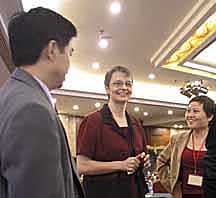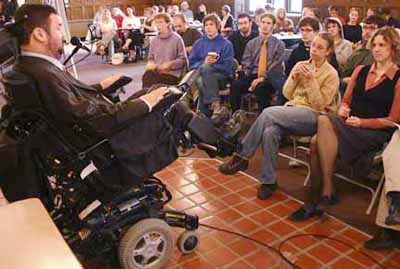Canadian Mennonite
Volume 11, No. 03
February 5, 2007

Project Ploughshares’ founder accepts
international ‘force’ as last ditch option
Nairobi, Kenya
 |
The international community’s responsibility to protect endangered populations when their governments fail to do so—if necessary, by the use of force—and church support for such measures was the subject of a lively debate at a World Council of Churches (WCC) workshop at last month’s World Social Forum in Nairobi.
The “responsibility to protect” is an emerging—but controversial—international standard. Although the concept recognizes that the primary responsibility to provide for the safety of their people lies with national governments, it also acknowledges that when there is a clear failure to carry out that responsibility, it is the international community’s duty to override sovereignty and intervene in the internal affairs of the faulty state in the interests and safety of those in peril.
“At certain times, resorting to force is necessary,” said Ernie Regehr, former director and co-founder of Project Ploughshares, a Canadian Council of Churches agency working with churches, governments and non-governmental organizations to build peace, prevent war and promote the peaceful resolution of political conflict.
But the use of force—which should come only when prevention has failed—has to be temporary, restrained, accompanied by humanitarian intervention and in the framework of peacebuilding efforts. “It’s not about regime change, but protection of vulnerable people in immediate peril of grave human rights violations,” Regehr emphasized.
Debate was lively at the crowded workshop. Questions were many and varied:
• Isn’t there a gap between the ideal and practice?
• What or who is the “international community,” and how can we trust such an entity?
• Don’t churches include both defenders and offenders when it comes to human rights?
• Isn’t there the risk of legitimating crimes?
Regehr stressed the international community’s lack of moral and political will to protect the vulnerable. “It is a tragic reality that, all too often, the international community does not accept its ‘responsibility’ to protect, but only the ‘option’ to protect when it suits their interests,” he said.
The risky character of the concept was acknowledged by Ambassador Bethuel Kiplagat from Kenya, a former moderator of the WCC Commission of the Churches on International Affairs. He asked, however, “What other better option is available in cases like the Rwandan genocide or in relation to the current plight of the children of northern Uganda where, over the last 20 years, thousands of young children have been kidnapped, tortured, raped and killed by anti-government rebels?”
Rev. Shirley DeWolf from Zimbabwe suggested that if a national church is not living up to its duty towards a population whose government is not protecting it, then the international church should fraternally call that church to stick to agreed-upon moral principles. “We have not been doing enough of this,” DeWolf said. “We have not been outraged enough.”
“The church can fail, sometimes spectacularly,” Regehr acknowledged. “But it still is a resource for good that needs to be fully mobilized.”
China Educational Exchange marks anniversary, name change
Chengdu, China
 |
China Educational Exchange’s 25th anniversary and its name change to Mennonite Partners in China (MPC) marks the program’s broadening work in China. MPC commemorated the anniversary with a celebration in Chengdu last October. While no major program changes are planned, the name change intends to more clearly identify MPC as a Mennonite program to its North American constituency.
“Since our work has moved beyond educational exchange to include church partnerships and social assistance, we felt that our name should not be as narrowly defined,” says MPC director Myrrl Byler.
MPC’s social services now include a student sponsorship program, rehabilitation for deaf and handicapped children and a counselling centre, as well as a church-based drug rehabilitation program. It serves mostly in Sichuan Province in south-central China. MPC will further its efforts in smaller and rural schools, and its work with Chinese people who are concerned about the society’s needs, such as poverty, the environment, health care and more.
Byler says the integrity of the program is found in the commitment and motivation of the more than 260 North Americans who have taught in China for at least one year. He also values the program’s principle of reciprocity, as almost 150 English teachers and foreign affairs officials, most of them from the Sichuan Province, have spent at least one semester at a Mennonite college.
Lawrence Burkholder, then president of Goshen College, signed an agreement with the Sichuan Provincial Bureau of Education for an undergraduate exchange in 1979. MPC’s predecessor (CEE) was created in 1981 to meet a request for an enlarged exchange and more teachers. Now it builds relationships and carries out projects with Chinese partners in educational institutions, local government organizations, social service agencies and Protestant churches.
With headquarters in Harrisonburg, Va., MPC is a program of four Mennonite agencies: Mennonite Church Canada Witness, Mennonite Mission Network, Mennonite Central Committee and Eastern Mennonite Missions.
Students pose tough questions to Conservative MP
Winnipeg
 |
Conservative Member of Parliament Steven Fletcher was impressed with the tough questions he was asked at a student forum at Canadian Mennonite University (CMU) late last year.
Surprisingly, perhaps, tuition and transit weren’t foremost on their minds. Rather, it was the environment, Canada’s role in the Middle East and aboriginal issues that they wanted to talk about.
When asked what Canada is doing to combat climate change, Fletcher admitted that Canada’s level of carbon dioxide emissions is currently 35 per cent higher than it was 13 years ago; as well, he noted that Canada does not expect to cut emissions until 2050. That, he said, was “embarrassing to admit,” but he noted that Canada only accounts for two percent of the world’s emissions.
Regarding Canada’s role in the Middle East, he said, “The prime minister has been very clear that, if given the choice between Israel and a terrorist group, we will pick Israel because it is a democratic country.” He went on to say that the Canadian government has cut off Palestinian aid because it will “not deal with terrorists, which we define as a group of people who inflict deliberate damage on civilians to create a high degree of terror.”
When asked about the growing divide between Canada’s First Nations people and the rest of the country, Fletcher said the issue is a “mind-boggling mess.” Two key problems, he said, are ownership of private property and the rights of women in First Nation communities.
“First Nations peoples don’t have the option to home equity rights, so that’s one thing we’re looking at,” he said, adding that “the rights of women” is another area of concern. “When there’s a breakdown in a marriage, the woman’s rights are squashed. So we’re looking at that as well.”
Fletcher, who represents the riding in which CMU is located, was on a blitz of schools by Conservative MPs in an effort to connect with young people across Winnipeg. His visit was arranged and hosted by the CMU Student Council.